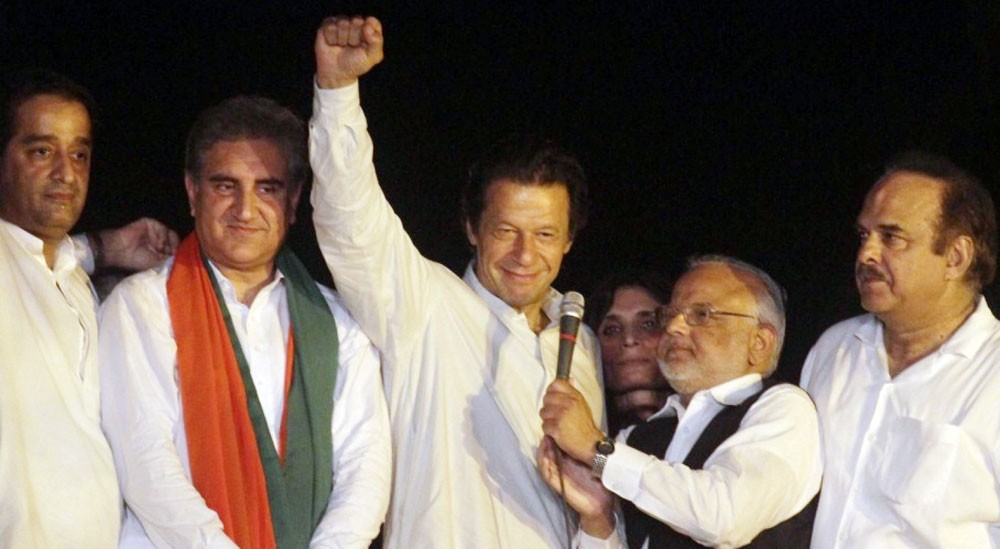
Has Imran Khan been hijacked or has his PTI been embroiled in an internal struggle for democracy or is the party continuing on the path of exclusionary politics?

Sharjeel the banker has a smug grin on his face, as I walk into his office. "Tabdeeli aa gayee hai boss!" I mumble a half hearted yes yes, and direct the conversation towards more pressing matters of finance. But most insafians today are carrying that smug grin, which, loosely translated, means "I told you so".
For a party that has been crying foul for over two years, the annulment of electoral results in three key National Assembly seats in the Punjab heartland is some vindication. Especially after the knockout punch delivered by the joint commission report that the 2013 general elections were, to a large part, fair and in accordance with the law. However, the pressure is now back on the PML-N and, as politics dictates, the other major opposition parties have wasted no time in putting their two cents as well.
Now, as the long Pakistani summer nears its end, the PML-N faces searing heat from all sides. Upset with the recent Army-led (and PML-N-sanctioned) crackdown against corruption in Sindh, the Pakistan People’s Party (PPP), has thrown its weight with the PTI for the upcoming local bodies (LB) elections in the chief province, and also joined the captain in his call for the resignations of the four provincial election commissioners.
However, the call for the resignations of the election commissioners does not equate to electoral reforms in any manner. How then, should one understand Khan’s latest call for street agitation in case his latest demands aren’t met?
"Imran’s strategy is simply an attempt to usurp power by non-electoral means," says Wajahat Masood, political analyst and columnist with The Daily Jang newspaper. "And in doing so, he is following a long tradition in Pakistani politics where the actual dictation is coming from somewhere else."
Masood cites the example of Zulfikar Ali Bhutto, who not only came into power with the backing of the armed forces but was also put to the gallows when it was thought that he had, or was about to, gain enough public support to not need the establishment’s crutch. The same happened with Nawaz Sharif. "The day Imran moves away from this strategy, we’ll see the same kinds of pressure on his party that we’re seeing on the others".
To understand the motive behind Imran Khan’s current demands, the first point of contact is Dr Arif Alvi, one of the founding members of the party, and a close confidante of the chairman. However, the good doctor fails to live up to his lofty reputation of being accessible and amenable to talk, mostly answering questions with rhetorical questions of his own. The next port of call is Shafqat Mahmood, another senior member of the party, and also the provincial organiser of the party in Punjab. "There’s not going to be any dharna on the 4th of October, just a single day protest," he clarifies.
Mahmood points towards the PTI’s active participation in the electoral reforms committee and believes that the bad press the party gets on its style of politics is unfair. "Protesting is a democratic right."
Off late, numerous publications have criticised the PTI’s leadership on its planned agitation, and following Wednesday’s meeting between the PTI leadership and the Chief Election Commissioner, Sardar Mohammad Raza Khan, it seems that there has been a certain de-escalation between the two.
Going forward though, the key is going to be the local bodies elections in Punjab and the by-elections as well. Following the crackdown against corruption in Sindh, which has targeted the PPP, the party has offered to work with the PTI on the LB level in Punjab. "We are not going into any alliance with anyone," says Mahmood. "There may be the occasional seat adjustment, that’s possible, but nothing else."
Can the PTI then, considering the internal problems the party is allegedly going through, create any sparks in the upcoming elections?
The answer varies, depending on whom you talk to. The official party stance is that there aren’t any problems. But if you ask others, there is a major problem of merit and corrupt practices. Justice (retd) Wajihuddin Ahmed is one such man. Currently suspended from the party, the retired judge believes "the party is currently embroiled in a struggle between the status quo and the original ideology of the party".
The Justice claims that the party has been hijacked by a handful of politicians, previously aligned with the PPP, the PML-Q and the like, who have virtually taken control of the party and are unwilling to implement its constitution.
Justice Wajihuddin Ahmed also points to gross illegalities committed by four members of the party, namely Pervaiz Khattak, current Chief Minister of KPK, Jahangir Tareen, Secretary General PTI, Nadir Leghari, President PTI Sindh, and Aleem Khan, President PTI Lahore, who, he claims, were found to have bought votes in the previous elections. "This tola (coterie) of four have the Khan’s mind".
Interestingly, Ahmed speaks of an internal inquiry into the cantonment board elections which found that Aleem Khan and others had "literally sold the party tickets". In the same way, during the KPK elections, tickets were not given on merit, but rather to kith and kin. "The same is going to happen in the upcoming LB and by-elections".
"The party will suffer, just like it did in KPK and the cantonment board," he says.
Perhaps then, it may begin the long walk back towards internal democracy.